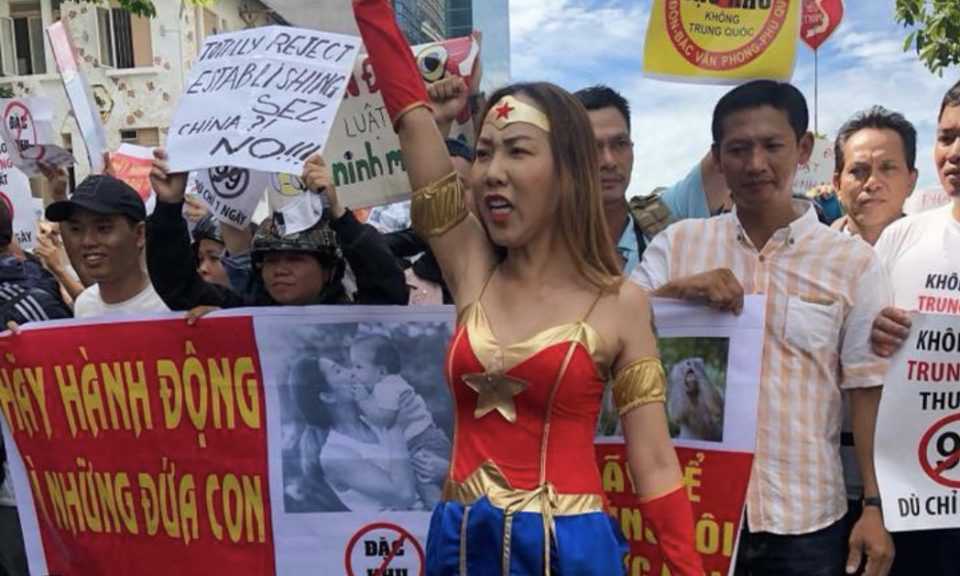Vietnam activists flash and dash under de facto martial law
21 July, 2018

Vietnamese activists and pro-democracy campaigners in Ho Chi Minh City are now locked in a game of cat-and-mouse with security forces as the country’s main economic hub falls under the grip of de facto martial law.
Authorities have tightened their public controls in the city in a bid to prevent new rounds of protests in the wake of last month’s popular eruptions against two controversial proposed laws on special economic zones and cybersecurity.
Tens of thousands participated in the rallies against the Communist Party-dominated government’s perceived selling out of national interests, namely to China, and curbing of online privacy and freedom in the name of order and security. Similar protests held across the country quickly morphed into calls for democracy and rights.
In a show of force, the government has since deployed riot police and armed militia members to main thoroughfares and major street corners in Ho Chi Minh City. Dedicated walking streets have been barricaded and closed to local residents and foreign tourists. Scores of activists involved in the protests have been detained in a gathering clampdown.
But patriotic pro-democracy activists are not bowing meekly to the government’s latest wave of repression. Initiated by a dissident known pseudonymously as Vu Thach, activists are now holding flash public protests at times and places where the police and security forces are not present in Ho Chi Minh City.
While the city’s center is under tight police control, campaigners have gathered in small groups in less popular areas at times when police lose concentration or switch shifts, often in the late afternoon or early evening.
Demonstrations in the past were mostly staged on Sunday mornings, giving people a chance to join outside of normal working hours. Those protests – sometimes staged over successive weekends and often against China’s perceived aggression against Vietnamese national interests – were usually closely watched and tightly contained by police before eventually being suppressed.
Activists have broken with that past predictability and are now holding demonstrations on weekdays. Instead of gathering and marching on the city center, activists are now rallying in short bursts, often showing banners and chanting on side streets and other peripheral areas in the city, departing the scene by motorbike before authorities can arrive.
The apparent goal is to sustain the campaign’s spirit while keeping a spotlight on the government’s repression. The movement has its roots in a 2007 popular response to a China-backed government plan to set up bauxite mining projects in the Central Highlands, an area known for its scenic beauty and a strategic area for national security.
Political dissidents, intellectuals and many former senior officials, including legendary General Vo Nguyen Giap and former vice-president Nguyen Thi Binh, opposed the projects because of the Chinese contractors’ involvement.
Hundreds of people signed a joint petition calling for the project to be abandoned. Although the government ignored their voices and continued the project, their acts are viewed in retrospect as the first wave of the country’s pro-democracy activism.
In subsequent years, activists publicly criticized as ill-conceived the government’s plans to build a high-speed electrical railroad connecting Hanoi and Ho Chi Minh City, with proposed budget of nearly US$56 billion, and a nuclear power project in the central coastal region with an estimated cost of tens of billions of dollars.
Activism took the form of public demonstrations beginning in 2011 when thousands of people took to the streets in Hanoi, Ho Chi Minh City and other cities to protest China’s violations of the country’s sovereignty in the South China Sea.
In the past, authorities tolerated some protests but violently dispersed others because they feared that the patriotic demonstrations might morph into anti-government expressions. Many activists were arrested, beaten and interrogated, and some were imprisoned in trumped-up politically motivated cases.
Still, there were two major campaigns in 2014 and 2016 that took the government by surprise. The first was in Hanoi when local activists and environmentalists took to the streets to protest the local government’s plan to chop down 6,700 old trees planted by French colonialists more than 100 years ago.
Vietnamese protesters demonstrate against Taiwanese conglomerate Formosa during a rally in downtown Hanoi on May 1, 2016. Photo: AFP/Hoang Dinh Nam
The second took place in mass nationwide protests against the Taiwanese Formosa steel plant’s discharge of vast amounts of toxic industrial waste into the country’s central coastal sea. The spill caused the death of tons of fish and was later characterized as the country’s most devastating environmental disaster ever.
In both cases, the government aggressively responded by violently dispersing crowds, arresting activists and even torturing those detained. Many activists, including Hoang Duc Binh, Nguyen Van Hoa, Nguyen Van Oai and Nguyen Ngoc Nhu Quynh, were convicted and sentenced to lengthy jail terms of between six and 14 years.
Between June 10 and 17 this year, Vietnamese authorities again arrested hundreds of protesters, beating many of them while in custody. Authorities in Ho Chi Minh City and Binh Thuan announced that they still held dozens of protesters while investigating them on allegations of “causing public disorders,” “disrupting security” and “resisting on-duty state officials.”
If convicted, they could face three to seven years in prison for each charge. At the same time, authorities in Ho Chi Minh City continue their persecution of released protesters through surveillance and restrictions on their movements.
But underground activists in the city remain undeterred as they continue their non-violent struggle through flash protests that erupt as quickly as they disperse. It’s a peaceful form of protest using so-called guerrilla tactics that many in the Communist Party’s oppressive state security appartus will well recognize.
TAG(s):
